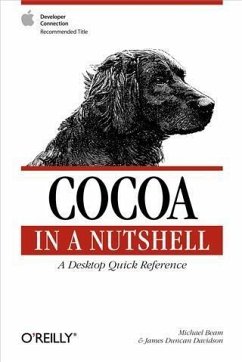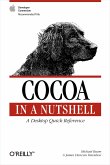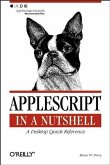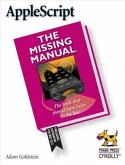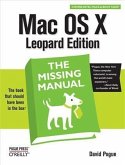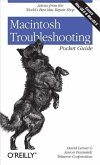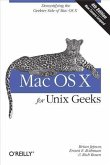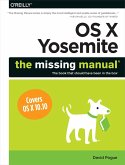Cocoa is more than just a collection of classes, and is certainly more than a simple framework. Cocoa is a complete API set, class library, framework, and development environment for building applications and tools to run on Mac OS X. With over 240 classes, Cocoa is divided into two essential frameworks: Foundation and Application Kit. Above all else, Cocoa is a toolkit for creating Mac OS X application interfaces, and it provides access to all of the standard Aqua interface components such as menus, toolbars, windows, buttons, to name a few.Cocoa in a Nutshell begins with a complete overview of Cocoa's object classes. It provides developers who may be experienced with other application toolkits the grounding they'll need to start developing Cocoa applications. Common programming tasks are described, and many chapters focus on the larger patterns in the frameworks so developers can understand the larger relationships between the classes in Cocoa, which is essential to using the framework effectively.Cocoa in a Nutshell is divided into two parts, with the first part providing a series of overview chapters that describe specific features of the Cocoa frameworks. Information you'll find in Part I includes:An overview of the Objective-C languageCoverage of the Foundation and Application Kit frameworksOverviews of Cocoa's drawing and text handling classesNetwork services such as hosts, Rendezvous URL services, sockets, and file handlingDistributed notifications and distributed objects for interapplication communicationExtending Cocoa applications with other frameworks, including the AddressBook, DiscRecording, and Messaging frameworksThe second half of the book is a detailed quick reference to Cocoa's Foundation and Application Kit (AppKit) classes. A complement to Apple's documentation, Cocoa in a Nutshell is the only reference to the classes, functions, types, constants, protocols, and methods that make up Cocoa's Foundation and Application Kit frameworks, based on the Jaguar release (Mac OS X 10.2). Peer-reviewed and approved by Apple's engineers to be part of the Apple Developer Connection (ADC) Series, Cocoa in a Nutshell is the book developers will want close at hand as they work. It's the desktop quick reference they can keep by their side to look something up quickly without leaving their work.Cocoa in a Nutshell is the book developers will want close at hand as they work. It's the desktop quick reference they can keep by their side to look something up quickly without leaving their work.
Dieser Download kann aus rechtlichen Gründen nur mit Rechnungsadresse in A, B, BG, CY, CZ, D, DK, EW, E, FIN, F, GR, HR, H, IRL, I, LT, L, LR, M, NL, PL, P, R, S, SLO, SK ausgeliefert werden.

